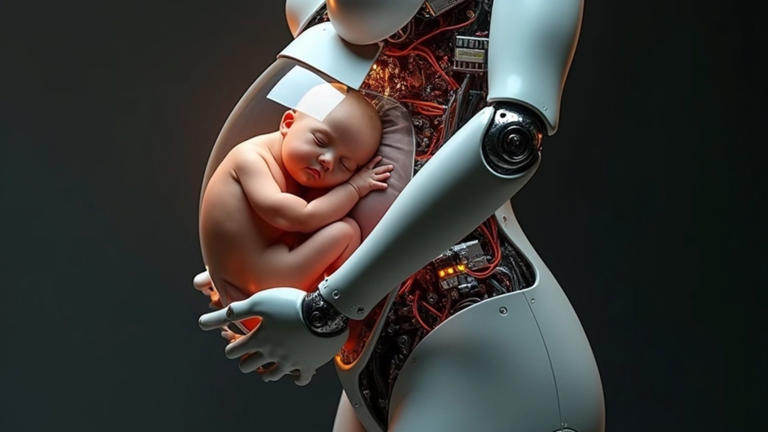For centuries, the act of carrying and delivering life has been bound to the biology of women. Now, that fundamental truth is being challenged by a vision straight out of science fiction: a humanoid robot with an artificial womb, designed to carry a child from conception to delivery.
Kaiwa Technology, a startup based in Guangzhou, has announced plans to debut the world’s first humanoid pregnancy robot by 2026. Unlike incubators or neonatal intensive care units, this device is imagined as a full-sized humanoid with an artificial womb embedded in its abdomen. Inside, a fetus would grow in synthetic amniotic fluid, nourished by nutrient lines that mimic the function of the umbilical cord. At the end of ten months, the robot would “deliver” the baby. And if the company’s founder, Zhang Qifeng, is correct, the machine will retail for under $14,000—a price point that suggests mass-market ambition.
The announcement has already set off a global firestorm of debate. To some, it is a beacon of hope for couples facing infertility, women unable to safely carry pregnancies, or even individuals who wish to become parents without enduring the physical and medical risks of gestation. To others, it is an ethical minefield that forces us to confront what it really means to be human, to parent, and to reproduce.
Artificial womb technology itself isn’t new. In 2017, researchers at the Children’s Hospital of Philadelphia grew a premature lamb in a fluid-filled “biobag” for several weeks, proving that mammalian development could continue outside a natural womb. More recently, labs have been exploring partial-gestation devices to rescue extremely premature infants. But what Zhang proposes is different: a full-term gestation robot that merges AI, robotics, and biomedicine into a single surrogate system.
The implications are staggering. If artificial wombs become reliable, they could decouple reproduction from the constraints of biology. They could expand parenthood options for same-sex couples, reduce maternal mortality, and even create an industry around outsourced pregnancy. Imagine fertility clinics filled not with waiting rooms, but with rows of humanoid machines quietly carrying the next generation.
Yet the hurdles are immense. Scientifically, no system has yet supported a fertilized egg through every stage of pregnancy. Ethically, questions of consent, commodification, and parent-child bonding loom large. Would a child born from a machine have the same legal status? Who is responsible if something goes wrong? And what happens when technology, once confined to infertility clinics, becomes a consumer product?
The timing of this announcement is telling. At the same World Robot Conference where Kaiwa’s pregnancy robot was revealed, Chinese researchers also introduced GEAIR, the world’s first AI-powered crop breeding robot—capable of autonomous pollination and hybrid seed production. Taken together, these breakthroughs point to a future where biology itself is reprogrammed, whether in the field or in the womb.
If Kaiwa delivers on its promise, it won’t just be launching a new product. It will be igniting a new era: one in which human reproduction is no longer solely human.
For more on related advances, see:
- Artificial womb technology edges closer to reality
- How robotics is reshaping reproduction and agriculture


